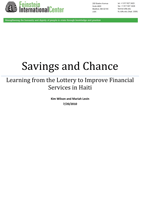Savings and Chance, a study by a team from the Center for Emerging Market Enterprises (CEME) at the Fletcher School at Tufts University explores the ubiquity of gambling practices in Haiti and their implication for financial services. As findings indicate, the Haitian lottery, known as the borlette, appears as a historical and cultural response to economic and social marginalization, as well as a manifestation of undeterred hope for a transformational lump sum, a sum large enough to allow them to escape their current circumstances. Formal and semi-formal financial institutions have a lot to learn from the borlette, which, in the minds of its users, is a pastime, a vice, a way to engage the spiritual realm, and a financial service.
With few employment prospects, mouths to feed, and small businesses to manage, accumulating cash to invest in an enterprise, home, or education becomes a difficult task in Haiti. To address the need for cash, many Haitians turn to the borlette for the chance to win a transformational lump sum. Over 35,000 lottery stalls in almost every village in Haiti present the poor with a possibility of earning 10, 20 or 50 times their wager to convert insignificant amounts of money into meaningful capital. Many Haitians overlook steady losses of playing the borlette since that same system in fact generates cash.







